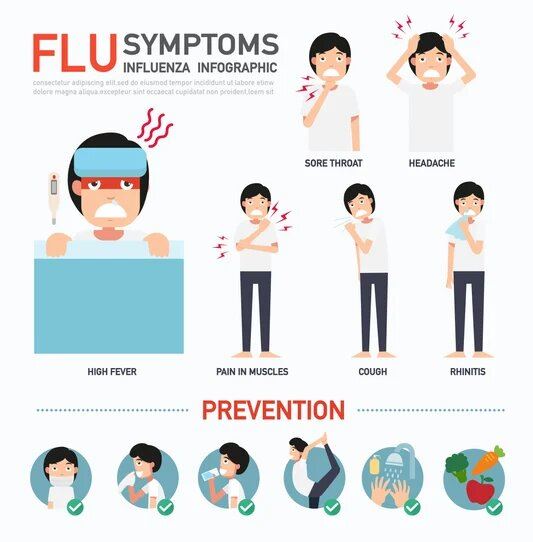12 Tips for Cold & Flu Prevention
- Category: Health & Wellness
- Posted On:
- Written By: Apicha Community Health Center
It’s cold and flu season, and now that winter has finally decided to show up in New York City Apicha Community Health Center wanted to remind you of tips you can use to stay healthy and make sure that you stay clear of these highly contagious illnesses.
Symptoms to look out for:
Unlike a cold, where symptoms may come on gradually, the flu usually hits all at once. Fever and severe body aches are common. Common symptoms you should watch out for are:
- Fever, chills
- Cough
- Sore throat
- Muscle aches/pain
- Lack of energy
- Runny or stuffy nose
What you can do to prevent the cold/flu:
In general:
 Get your flu vaccine and encourage your loved ones to as well. The CDC recommends a yearly flu vaccine for everyone 6 months of age and older as the first and most important step in protecting against this serious disease.
Get your flu vaccine and encourage your loved ones to as well. The CDC recommends a yearly flu vaccine for everyone 6 months of age and older as the first and most important step in protecting against this serious disease.- Avoid contact with your face. Germs are often spread when a person touches a surface or object that is contaminated with germs (especially door handles or surfaces on the subway) and then touches his or her eyes, nose, or mouth.
- Cover your coughs and sneezes. The CDC advises coughing into tissues as well and states that if a tissue is unavailable, cough or sneeze into your upper sleeve rather than your hand. Afterward, dispose of the tissue if you used one, and wash your hands or use a hand sanitizer that contains with an alcohol content of greater than 60%.
- Wash your hands or use hand sanitizer. As I’m sure you’re very aware, New York City is dirty. Washing your hands with soap and water or using a sanitizer to disinfect your hands are two of the best things a person can do to keep themselves safe during cold/flu season. Wash or sanitize your hands before eating and after blowing your nose, coughing, or sneezing. Wash your hands with soap and water after using the restroom. The CDC recommends that you wash your hands for the length of about two “Happy Birthday” songs.
- Keep a collection to fight germs. Tissues, hand sanitizer, and products for cleaning work spaces are three basic purchases employers can make for fighting germs around the office. Also consider investing in no-touch trashcans.
- Exercise for immunity. 20 to 30 minutes of cardio two to three times per week can not only help you with your physique, it also might prevent you from getting sick.
- Avoid close contact. Avoid close contact with people who are sick. When you are sick, keep your distance from others to protect them from getting sick too.
At home:
- Know how long colds last. If someone at home has the cold or flu, they can harbor the virus for one day before getting sick and for up to seven days after getting sick. Designate an area for them in the house to keep them from contaminating other parts of the house.
- Not sharing is caring. Since the germs can be there before you’re even aware of it. It’s best to not share cups, glasses, plates, and utensils that can risk passing germs from one family member to another
- Clean surfaces. Wipe down surfaces with a clean, disposable paper towel and then throw the towel out. Give extra attention to beside tables, bathroom counters, faucet handles, and kitchen counters.
At work:
- Stay at home if you’re sick. You might think that you’re being a good worker by coming in to work no matter what but you’re really just cutting down productivity by spreading your germs to your coworkers. Also, consider giving a flu shot.
- Be aware of popular germ locations. Most people think that the communal restroom is where most of the germs are, but that’s nothing compared to what’s around other areas of the office. Microwave buttons, coffee pot handles, sink faucets, and break room counter tops are some of the top germs spots around the office. While the restroom gets constant disinfecting attention, how often have you seen someone disinfecting the microwave?
Make an appointment to see your primary health care provider if you think you or someone in your family has the flu. If you think you have the flu, stay home, unless you need medical care. In that case, wear a surgical or procedure mask to avoid spreading germs.
If you're interested in scheduling an appointment with us, you can give us a call at (866) 274-2429 or click here to request an appointment and we'll have someone from Apicha CHC contact you to help schedule your appointment.
We know choosing a medical provider is a big decision and we’d love for you to become a part of our family. If you have other questions about becoming a patient at Apicha's Manhattan Medical Clinic, we've put together a list of frequently asked questions, here.
